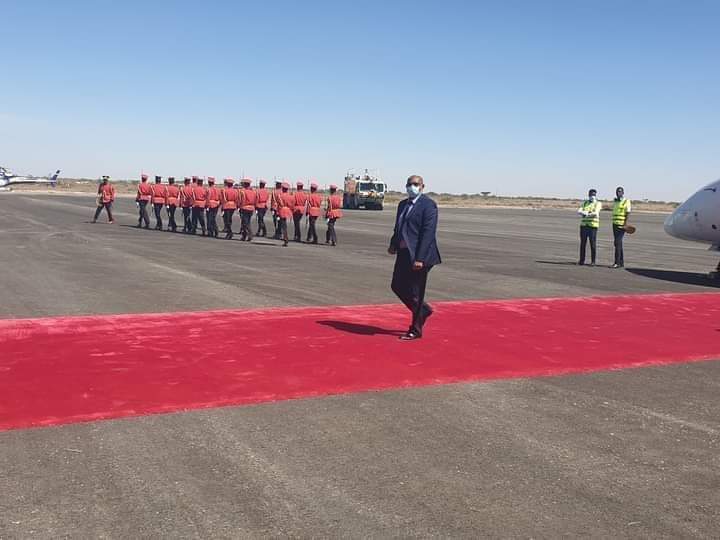In a long impassioned part of his address to the nation at the occasion of the 28th anniversary of the Somaliland national army, His Excellency the President of the Republic of Somaliland, Musa Bihi Abdi, called the African Union to respect its own mission findings and acknowledge Somaliland’s conformity to its border-related tenets.
“We call the African Union in Addis Ababa to implement own mission report in 2005 on Somaliland which established that Somaliland should be treated on its own merits as it case did not violate any of the Union Acts and adopted resolutions,” President Bihi said.
The President was referring to a report of a Mission the AU sent to Somaliland from 30 April to 4 May in 2005.
The mission concluded that the Republic of Somaliland had all the requisite trappings of a modern state based on principles that did not contravene any of the Union’s resolutions and acts.
The Mission demystified the argument that if Somaliland was recognised, many more African states will follow suit pushing their current boundaries any which way they fancied into other countries thereby igniting new conflicts.
The Charter of the Organisation of African Unity (OAU), Resolution AHG/Res.16(I) on border disputes between African States, adopted by the 1st Ordinary Session of the Assembly of Heads of State and Government of the OAU, held in Cairo, Egypt, in July 1964, and article 4 (b) of the Constitutive Act of the African Union, stated that African states must “respect of borders existing on achievement of independence”.
It was later echoed by the Declaration on the African Union Border Programme and its implementation modalities as adopted by the conference of African ministers in charge of border issues held in Addis Ababa (Ethiopia), on 7 June 2007.
“Somaliland has territory as defined by the colonial borders inherited from the British colonial rule on accession to independence in 1960. In the north, the country is bordered by the Red Sea and the Gulf of Aden adjoining into the Indian Ocean; Puntland State borders it on the east, the while Ethiopia neighbours it on the west. To the north-west, Somaliland is bordered by Djibouti,” the report pointed out.
“Since its declaration of independence in 1991, Somaliland has been steadfastly laying the foundations of a democratic State, clothed with the relevant attributes of a “modern State”. Those foundations include the Constitution of Somaliland which entrenches, among other aspects, the separation of power between the three arms of government; balance of political forces built upon the functional co-habitation of traditional governance institutions, as embodied in the political role of the clan elders and elected representatives; the existence of active opposition political parties with some capacity to influence public policy and a budding independent press,” the mission again established at the head of its key findings.
“Whilst it remains a primary responsibility of the authorities and people of Somaliland to deploy efforts to acquire political recognition from the international community, the AU should be disposed to judge the case of Somaliland from an objective historical viewpoint and a moral angle vis-a-vis the aspirations of the people,” the mission clearly recommended.
The Deputy Chairperson of the African Union Commission, H. E. Patrick Mazimhaka, led the Mission, accompanied by Dr A. M. Kambudzi, Analyst in the Peace and Security Department; Col. Jaotody Jean de Matha, Senior Military Expert, in the same Department; Mr Patrick Tigere, Head of the Humanitarian, Refugees and Displaced Persons Division in the Department of Political Affairs and Mr Dieudonne Kombo Yaya, Senior Political Officer, in the same Department, led the mission.
The findings all built up the fact that the Republic of Somaliland perfectly conformed to all tenets, resolutions and references alluding to the inviolability of colonial borders at times of independence to prevents all sorts of changes to borders between countries including clan-inspired demarcations.
It may not be a coincidence that, following President Bihi’s visit to the AU seat, Addis Ababa, on January 19, the Somaliland Foreign Minister, Dr Essa Kayd, is going to attend the AU Summit scheduled to open in that city for the first time in the country’s history. Ethiopia laid him the red carpet.
Dr Kayd will certainly remind luminaries he meets there of the AU’s own 2005 mission.

 President Bihi, on the other hand, urged Somalia administrations not to distort history to suit their political ambitions. He said the two countries Somaliland and Somalia were better off as two, interdependent sovereign, neighbour states.
President Bihi, on the other hand, urged Somalia administrations not to distort history to suit their political ambitions. He said the two countries Somaliland and Somalia were better off as two, interdependent sovereign, neighbour states.
“Their gains are ours. Their distress is our pain. But that doesn’t mean Somalia should jealously cling to us beckoning us to jump into the melee. the anarchy, the conflict they are struggling with, They must recall we came together as two sovereign states in 1960, and that, after this union abysmally failed, we have every right to retreat from it,” he said.
He added, voicing a popular Somaliland sentiment, that Somaliland wished Somalia and Somalians to prosper and find peace as soon as possible in order for them to develop.
“To block every developmental initiative in Somaliland or to claim it was part of Somalia which it never was as was anticipated in the 1960 merger and never would be is foolhardiness going against the grain of all that was legal, decent or customarily Somali,” President Bihi said.




 AU 2005 Somaliland Mission Findings: PDF Copy
AU 2005 Somaliland Mission Findings: PDF Copy
Source: Somtribune












